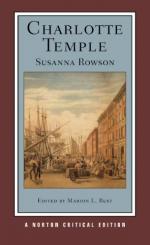CHAPTER II.
Domestic concerns.
Mr. Temple was the youngest son of a nobleman whose fortune was by no means adequate to the antiquity, grandeur, and I may add, pride of the family. He saw his elder brother made completely wretched by marrying a disagreeable woman, whose fortune helped to prop the sinking dignity of the house; and he beheld his sisters legally prostituted to old, decrepid men, whose titles gave them consequence in the eyes of the world, and whose affluence rendered them splendidly miserable. “I will not sacrifice internal happiness for outward shew,” said he: “I will seek Content; and, if I find her in a cottage, will embrace her with as much cordiality as I should if seated on a throne.”
Mr. Temple possessed a small estate of about five hundred pounds a year; and with that he resolved to preserve independence, to marry where the feelings of his heart should direct him, and to confine his expenses within the limits of his income. He had a heart open to every generous feeling of humanity, and a hand ready to dispense to those who wanted part of the blessings he enjoyed himself.
As he was universally known to be the friend of the unfortunate, his advice and bounty was frequently solicited; nor was it seldom that he sought out indigent merit, and raised it from obscurity, confining his own expenses within a very narrow compass.
“You are a benevolent fellow,” said a young officer to him one day; “and I have a great mind to give you a fine subject to exercise the goodness of your heart upon.”
“You cannot oblige me more,” said Temple, “than to point out any way by which I can be serviceable to my fellow creatures.”
“Come along then,” said the young man, “we will go and visit a man who is not in so good a lodging as he deserves; and, were it not that he has an angel with him, who comforts and supports him, he must long since have sunk under his misfortunes.” The young man’s heart was too full to proceed; and Temple, unwilling to irritate his feelings by making further enquiries, followed him in silence, til they arrived at the Fleet prison.
The officer enquired for Captain Eldridge: a person led them up several pair of dirty stairs, and pointing to a door which led to a miserable, small apartment, said that was the Captain’s room, and retired.
The officer, whose name was Blakeney, tapped at the door, and was bid to enter by a voice melodiously soft. He opened the door, and discovered to Temple a scene which rivetted him to the spot with astonishment.
The apartment, though small, and bearing strong marks of poverty, was neat in the extreme. In an arm-chair, his head reclined upon his hand, his eyes fixed on a book which lay open before him, sat an aged man in a Lieutenant’s uniform, which, though threadbare, would sooner call a blush of shame into the face of those who could neglect real merit, than cause the hectic of confusion to glow on the cheeks of him who wore it.




